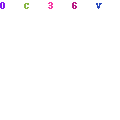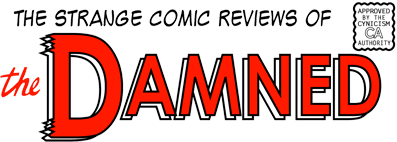I would like to apologize to everyone who clicked on the link to my first Comic Remix feature over at PopCultureShock.com – yes, it was broken, but now, it is working. If you missed it before, check it out.
I expect (hope? fear?) that it will only be a matter of time before someone pitches a Woodgod series, now that I’ve successfully reintroduced this fine character into the public imagination.

The sad part is that I had no trouble finding a picture of Woodgod on Google. True, it is courtesy of another site that was mocking the character, but still. When Mark Millar announces his new Ultimate Woodgod series at the next Comicon, you can all thank me.
I’ve got a question for anyone who reads this blog regularly: do you pay any attention to the music recommendations over on the sidebar, or the posted music reviews? I would be very interested to hear if anyone actually bought a CD based on my recommendation, and if they did, I’d be interested in hearing if they liked it. Just pure curiosity on my part, nothing more or less.

Oni Love Can Break Your Heart - Part V

Love Fights Vol. 1
I have a love/hate relationship with Andi Watson’s work. On the one hand, he’s a pretty good cartoonist, with a strong eye for design that comes across in his cover and pin-up work. His work is attractive, and definitley makes you interested in reading the books. On the otherhand, I’ve never read a Watson comic that I’ve really liked. I thought Breakfast After Noon was so bad that I wanted my money back after I finished it (I also had the same reaction, if there’s any consolation, to High Fidelity, and for much the same reasons). I have the Complete Geisha book, which I purchased based on the fact that I found the Geisha one-shot (which I received for free) very good. But of course, the bulk of the Geisha stories turned out to be not so very good. So, Watson has burned me twice, and I wasn’t exactly eager for a repeat performance.
To my surprise, the first volume of Love Fights wasn’t bad. It didn’t suck. That may seem like faint praise, but considering my history with Watson, I’m not being generous to call “doesn’t suck” a vast improvement over the mind-numbing craptitude of Breakfast After Noon.
I do have to wonder, however, at just who this book is aimed at. In the first place, it’s a romance, which is a decidedly underserved market for the domestic comics industry. But it’s also got these superhero elements featured very prominently. There’s been a movement in the last five or seven years to attack the problem of market diversity sideways, but producing superhero hybrid books. You’ve got superhero/crime (Daredevil), superhero/gritty espionage thriller (Sleeper), superhero/political drama (Ex Machina), superhero/sci-fi (most of Crossgen’s output), etc etc. The question is whether or not this type of hybridization creates authentic diversity or merely creates strange mutant genres that appeal to an even smaller demographic that straight spandex. Will a superhero/espionage book appeal to people who like superhero stories and people who like espionage stories, or will the spandex elements merely alienate the latter, while the strong espionage mood goes a long way towards alienating the former? Based on the market “success” of critically acclaimed books like Sleeper, I have to say that my gut tells me hybridization is a mug’s game. I could be wrong because there are obviously many more issues here than I am examining, but it seems to me that this is a classic instance of trying to be all things to all people, and coming up dreadfully short.
Will the romance elements appeal to the Average Potential Customer looking through the stacks at their local Borders, or will the superhero elements repel them? Good question, and if i had the answer I'd be a rich man.
According to a supplementary feature tacked on to the end of the book, the genesis of Love Fights dates back to Love in Tights, a late-90s anthology of superhero/romance stories published by Slave Labor for which Watson did some covers. I must admit, the confluence of the romance and superhero genres makes about as much sense as everything else. There's been a big segment of the superhero world that has floated almost solely on soap-opera elements since Stan Lee brought them to the fore back in the early 60s. (Of course, superhero books had always had soap-opera elements, but they had been in the far background compared to, say, Lee’s Spider-Man, where the sudsy soap stuff was brought to the extreme foreground.)
So while I enjoyed the romantic entanglements in Love Fights, there was nothing really original in Watson’s approach. The basic story is Jack is a comic book penciller works on the licensed & authorized comic book for the Flamer, a mid-list superhero who’se popularity is on the wane. Jack falls for Nora, who is an up-and-coming cub reporter at a gossip magazine dedicated to exposing the private lives and embarrassing secrets of superheroes. The first story Nora gets is an expose on the Flamer’s illegitimate love child, the revelation of which sends the Flamer’s comic magazine – and Jack’s career pencilling said magazine – into the toilet.
It’s not the most original story in the world, but you can pretty much say the same about most romance yarns. Guy meets girl, there’s a complication, they struggle, and eventually they end up together. If the struggle is tied intrinsically to their career advancements, all the better for squirmingly sadistic plot-twists.
The best parts of the book, however, have less to do with the romance than with the little subplots that are sparingly peppered throughout. For instance, Jack’s cat Guthrie accidentally gains super powers and sets off on a successful crime-fighting career as Future Feline. This is a great plot, and I for one would happily buy a Future Feline series. There’s another fun subplot involving a Vince Colletta stand-in – which would have been a lot funnier if they had somehow managed to show the character inking with his penis (I know that’s an old joke, but every Vince Colletta joke is old by now).
I’d be interested to know whether or not the gray tones throughout the book are charcoal, pastel or computerized. They give the book a very distinctive look. The art throughout is strong, but sometimes Watson’s design sense gets in the way of his storytelling acumen.
This is a likeable book, featuring likeable characters in generally believable situations. Many of the problems I have with romance stories have to do with the fact that oftentimes plot points have a tendency to hinge on unrealistic character traits. These are the kinds of stories where misunderstandings occur with frightening regularity because of the characters’ inability to communicate in a semi-functional manner, or because of frighteningly low tolerances for suspicion and jealousy. Thankfully ,Love Fights relies on relatively few of these contrivances to keep the plot going. (And they are contrivances – anyone with two brain cells know that most plot complications are just that, intended to keep the movie from ending an hour early.)
This is the first volume. I don’t know how many volumes are projected to follow, but there’s a tolerable chance that I might want to see how things turn out.





No comments :
Post a Comment